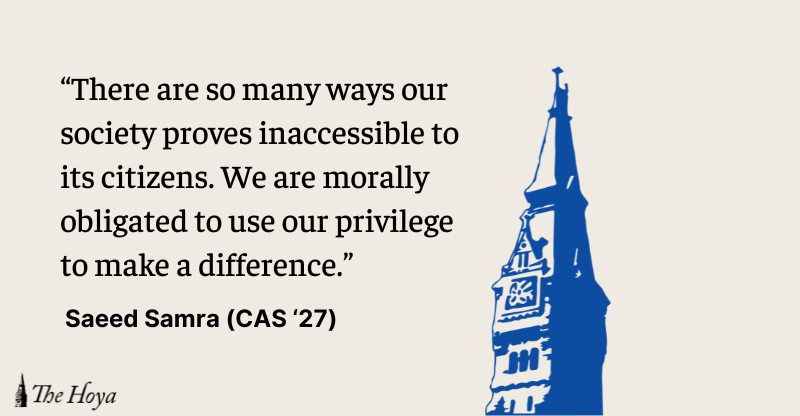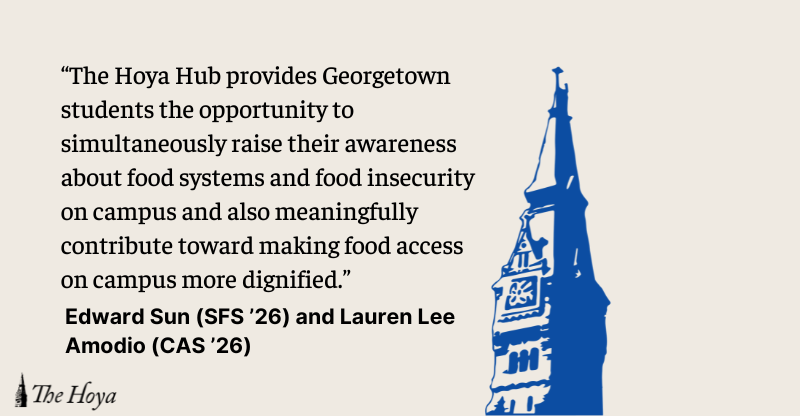The Republican tax bill that passed in the U.S. House of Representatives on Nov. 16 represents a threat to the livelihoods of graduate students. Right now, tuition for most Ph.D. students is waived — in exchange for their work in research and teaching — and tax-free. The new bill proposes that the waived tuition be taxable.
The hardships imposed by the GOP tax plan would discourage new students from pursuing a graduate education and even leave many students with no other choice than to abandon their studies.
Washington, D.C., is currently one of the most expensive cities in the country to live in, according to The Washington Post. Graduate students at Georgetown University already earn less than the living wage for the District. As such, cuts in our pay will affect our everyday lives, making it difficult for us to complete our degrees.
Currently, students earning their Ph.D. in biomedicine at Georgetown earn about $30,000 each year. We are required to pay taxes on that amount plus the value of our health insurance — around $2,680 — resulting in the average student paying around $2,876 in taxes each year. Students are then left with $27,124 to cover rent, utilities, groceries, transportation and other essential expenses.
Unfortunately, the tax plan that the House passed would drastically increase the amount that graduate students must pay in taxes. First and second year Ph.D. students would see their tax obligations increase by nearly 400 percent.
The financial strain this bill would impose on graduate students would deter both enrolled students and prospective candidates from pursuing doctorates. This brain drain would be tragic, as graduate students make integral contributions to Georgetown’s mission as an institution of higher education.
Graduate students not only serve as teaching assistants and teaching associates for undergraduate classes, but many of us at the Georgetown University Medical Center have taught graduate and medical students as well.
Fewer graduate students would mean that many professors would lose TAs to help run their courses. Losing us would force the university to cancel classes typically run by graduate students, like “Drugs, the Brain and Behavior.”
Having formerly served as the course director for this class, I can attest that students enjoyed and benefited from learning about the latest data in the field by graduate students doing related work.
Graduate students also conduct research that contributes to Georgetown’s status as a Research I international center for scholarly research. As such, we publish in top-tier journals such as “The Journal of Neuroscience” and present at conferences around the world. We work with our mentors on research grants that help keep Georgetown functional and competitive.
Losing us would not only decrease research productivity and revenue, but it would also eliminate one of the reasons that many undergraduates and master’s students choose to commit to Georgetown in the first place.
In addition to graduate students’ curricular and research contributions to Georgetown, we also participate in organizations that directly give back to the D.C. community.
For example, the Medical Center Graduate Student Organization has a volunteer program that allows us to teach science to young students in D.C. public schools. Graduate student organizations also host public speakers who address issues such as improved access to health care.
With the benefits that graduate students provide to the community, it is imperative to stop the GOP tax bill in its current form, as its passage would be detrimental to the lives of graduate students.
In a Nov. 21 email, University President John J. DeGioia suggested ways in which students can voice their opposition to a piece of legislation that would have a devastating effect on our community. The university is currently working with the American Council on Education, a great resource for staying informed.
You can also take direct action. If you are a resident of Georgia, Idaho, Iowa, Kansas, Louisiana, Nevada, North Carolina, Ohio, Pennsylvania, Nevada, South Carolina, South Dakota, Texas, Utah or Wyoming, call and write to your senators. The senators from these states are Republican members of the Senate Finance Committee who will have to negotiate with the House over the final version of any tax legislation.
With this advocacy, we will hopefully be able to prevent the passage of a bill that could deter students from getting an education and have starkly detrimental effects on our community.
Nour Al-muhtasib is a doctoral candidate at the Georgetown University Medical Center.




















Ad maius bonum? • Dec 2, 2017 at 11:46 am
Is the author defending education or the current tax policy?
Tim Drayton • Nov 28, 2017 at 2:34 pm
To me, the key part of your Viewpoint is the sentence in the first paragraph which contains”… in exchange for their work …”. In virtually every other sector of the American economy, those who receive some benefit for the work they perform are taxed in some way. Why should graduate students be yet another special interest group to be treated differently ?
Further, I appreciate the hard work performed in the community by gradute students. However, they are not unique in this regard and many organizations provide services to the community and are still taxed on their earnings. To suggest that graduate student
Georgetown has an estimated $1.5B endowment. Perhaps they can afford to pay graduate students an acceptable wage for the work performed which will allow students to continue their studies and not have the American taxpayer subsidize yet another special interest ?